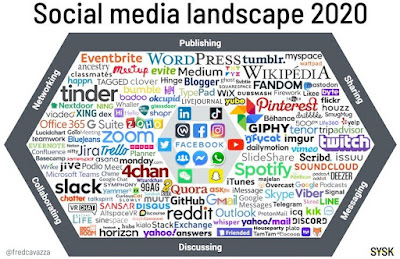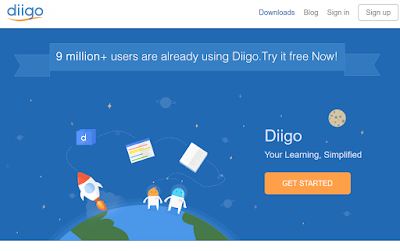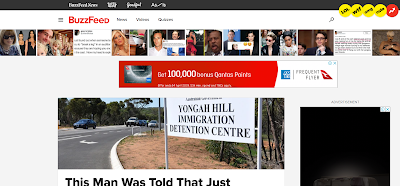Session 2 Social Media Categories
Social Media
Definition from Wikipedia:Social media refers to interaction among people in which they create, share, and/or exchange information and ideas in virtual communities and networks.
Andreas Kaplan and Michael Haenlein define social media as "a group of Internet-based applications that build on the ideological and technological foundations of Web 2.0, and that allow the creation and exchange of user-generated content."
Furthermore, social media depend on mobile and web-based technologies to create highly interactive platforms through which individuals and communities share, co-create, discuss, and modify user-generated content. They introduce substantial and pervasive changes to communication between organizations, communities, and individuals.
Some Social Media Charts.
The number and definition of categories of Social media vary from article to article and can be anything from 5 upwards.There are lots of text-based lists of categories, but I personally LOVE a great infographic.
Here are 2 variations plus 1 for fun:
https://conversationprism.com/
The above poster can be downloaded at:
https://drive.google.com/file/d/0B5lO3kL4ncWKbUlMUEdsSkc0cG8/view
This graphic shows that there can be MANY variations on the social media categories.
Fred Cavazza.net 2020
Class Activity 1
Use Google (or your preferred search engine) to search for previous versions of Fred Cavazza's Social Media Landscape infographicWhat year does the first one reflect?
Based on the infographics Social Media Landscape, how has social media changed over the years?
Cats
and sometimes cats can just explain things better....If you would like some other opinions on categories of social media, you can look at the following links:
Wikipedia: http://en.wikipedia.org/wiki/Social_media
ThinkFirst: http://outthinkgroup.com/tips/the-6-types-of-social-media
Last week I mentioned our class Facebook Group and I think most of you have now joined.
Facebook Group
Some of you have joined, and there has been some posts/discussions happening. It is compulsory that you join Facebook as part of this subject (well VERY highly recommended otherwise it will be very hard to do the unit). If you have issues regarding privacy or security there are a couple of options for your Facebook to remain reasonably anonymous.- Create a new email address just for Facebook and use a pseudonym, but it must sound realistic as Facebook has cracked down on fake names. If you do this, please let me know so that I can accept you into the group.
- Use your existing Facebook account, or create one if you don't already have one, but set the privacy settings high so that your timeline is hidden from everyone.
Class Activity 2
Let's write up/discuss a set of rules for our Facebook group. We can use the whiteboard wall to come up with our rules and decide which ones we should adopt.Why do we need rules?
Categories of Social Media
There are many different variations of the categories of Social Media. I think this one is pretty accurate and reflects my thinking on the topic.https://www.digitalvidya.com/blog/types-of-social-media/
Social Networking
In short, social networking is a group of friends, colleagues or just random people that you share information and ideas with.So what choices do we have in online social networking?
Like any tool, there are many advantages and of course there are some negatives. Generally, common sense rules when it comes to how much information you should post on Social Networking sites such as Facebook.
Here are some useful links about security and Facebook
https://www.facebook.com/about/security
Facebook Privacy Settings: How to Make Facebook Private in 2021 https://www.cloudwards.net/facebook-privacy-settings/
https://www.wired.com/story/facebook-privacy-apps-ads-friends-delete-account/
And some information from the Australian Government:
https://esafety.gov.au/
http://www.australia.gov.au/information-and-services/public-safety-and-law/online-safety
https://aifs.gov.au/cfca/publications/online-safety
Class Activity 3
What other Social NETWORKING tools do you use or know of or use?Scams
Here are a few links that you can use to find out about scamshttp://www.scamwatch.gov.au
http://www.snopes.com/
Class Activity 4
Take the Scams Quiz https://www.consumer.vic.gov.au/resources-and-tools/scams/scams-quiz
The Australian Government on Social Media
The Australian Government has a presence on a range of social media.http://www.australia.gov.au/news-and-social-media/social-media/facebook
Here are some of the groups and/or pages that I follow
Libraries
Casey Cardinia Library Corporation (CCLC)
Frankston City Libraries
West Gippsland Regional Library Corporation (WGRLC)
Eastern Regional Library
Technology
Mashable
Gizmodo Australia
My Technology Guide
The Verge
Lifehacker
Microsoft Education
Interests
The Age
News.com.au
Herald Sun
Victoria Police
CFA
Gippsland Poultry
Backyard Poultry
Various local Buy/Sell/Swap groups
and finally, some Facebook etiquette.
10 golden Facebook etiquette rules you should always follow
https://www.curvearro.com/blog/10-simple-facebook-etiquette-rules-you-must-have-to-follow/
The 12 rules of facebook etiquette
https://www.lifehack.org/articles/communication/the-12-rules-facebook-etiquette.html
Other Social Networking tools:
https://www.lifewire.com/top-social-networking-sites-people-are-using-3486554TEAMS
What is a TEAM?
A group of people with a full set of complementary skills required to complete a task, job, or project.
Team members:
- operate with a high degree of interdependence
- share authority and responsibility for self-management
- are accountable for the collective performance
- work toward a common goal and shared rewards(s).
A team becomes more than just a collection of people when a strong sense of mutual commitment creates synergy, thus generating performance greater than the sum of the performance of its individual members.
Innovation
What is innovation?
Innovation means coming up with new ways to do things. You can change processes or create more effective products and ideas.
Innovation can help you save time and money. It’s also key to your business developing a competitive advantage and creating a culture of innovative thinking and problem solving.
Read the following article on innovation. The article mentions 10 ways to create an innovative environment within your organisation.
Class Activity 5 - Teams
For each of the 10 items in the list, give an example of a team you have been in where this has occurred and how it affected the team. Did it improve the performance/productivity of the team? If you haven't experienced any of these 10 items, explain how it could have been implemented.If you have not been part of a workplace team, use the article below for some ideas on how an individual can be innovative in the workplace.
https://www.themuse.com/advice/10-ways-you-can-innovate-at-work-every-single-dayno-matter-how-boring-your-job-title
https://innovationmanagement.se/imtool-articles/21-great-ways-to-innovate/






Comments
Post a Comment